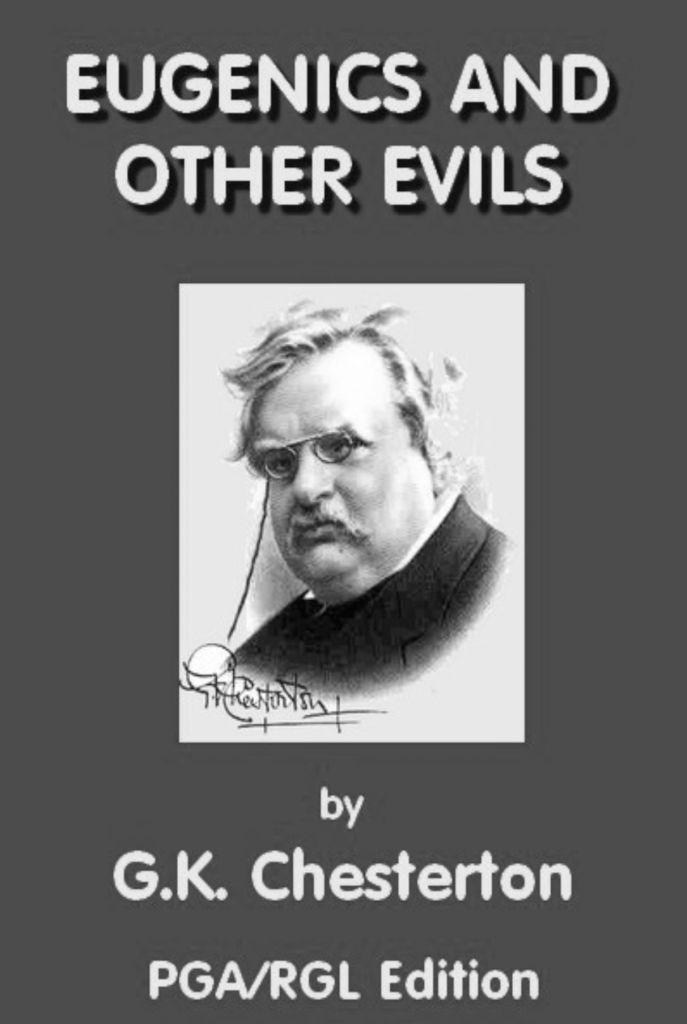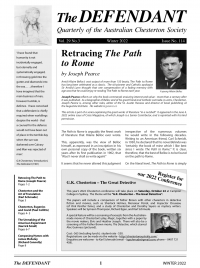
Has eugenics taken on new force today – a century after Chesterton fought against it in his book, Eugenics and Other Evils (1922), and it was thought discredited by Hitler’s enforcement of the practice.
Paul Collits (pictured), a retired academic and independent researcher contributing
to such journals as The Spectator Australia and Quadrant, argues that eugenics is
now actively promoted in various, though disguised, ways. Drawing on Chesterton’s
insights, he notes the influence of today’s eugenics thinking behind such movements as the push for euthanasia and the responses to Covid and a perceived environmental calamity.
Readers of The Defendant probably don’t need to be reminded of the breadth of Chesterton’s interests and of his “projects”.
He was a master Christian apologist, a champion of realism, a fierce combatant in the culture wars of his day, a slayer of cant, a saviour of souls. Not a saint, according to some, but nonetheless a committed, persuasive and consequential soldier of Christ. And always with a twinkle in his ever-perceptive eye.
One of GKC’s projects was his war on eugenics. He was an anti-eugenics activist, a long time before that term existed in popular culture. It happens to be exactly one hundred years ago this year since the publication of his collection of essays, Eugenics and Other Evils: An Argument Against the Scientifically Organized State. An interesting and still relevant sub-title, to say the least. As Goodreads notes:
In the second decade of the twentieth century, an idea became all too fashionable among those who feel it is their right to set social trends. Wealthy families took it on as a pet cause, generously bankrolling its research. The New York Times praised it as a wonderful “new science. In the 1920s, almost three-fourths of high school social science textbooks taught its principles. Not to be outdone, judges and physicians called for those principles to be enshrined into law.”
Sound familiar? The right to set social trends? families? Bankrolling research? New science?
One definition of eugenics is as follows:
“… the study of how to arrange reproduction within a human population to increase the occurrence of heritable characteristics regarded as desirable. Developed largely by Sir Francis Galton as a method of improving the human race, eugenics was increasingly discredited as unscientific and racially biased during the 20th century, especially after the adoption of its doctrines by the Nazis in order to justify their treatment of Jews, disabled people, and other minority groups.”
Eugenics had its unfashionable period. No doubt, Adolf Hitler helped. Chesterton said that the modern world was “insane”. What would he make of our post-modern times? Where to start?
An age in which the elderly and frail are encouraged to end their own lives “with dignity”. A palpably and unashamedly post-Christian age. An age when men marry other men, and where this is celebrated, not only by just about everyone, but also by most of our institutions and at least one Jesuit priest in Vien- na. An age committed to reducing, not growing, our population. Because more people are bad for “the environment”. And where viruses are seemingly invented in laboratories with a view to culling the sick and the old. An age when those who defend life, like a number of American Supreme Court judges have done, following the deaths of around sixty million unborn babies in half a century, have their very lives threatened. An age when society’s “moral” leaders, these days oddly the captains of industry, are lauded for their adherence to the culture of death.
Back in 1922 – the other ‘roaring twenties’ – Chesterton said this about the then powerful eugenics movement…
There exists to-day a scheme of action, a school of thought […] called for convenience “Eugenics”; and that it ought to be destroyed I propose to prove in the pages that follow. I know that it means very different things to different people; but that is only because evil always takes advantage of ambiguity […] and Eugenics itself, in large quantities or small, coming quickly or coming slowly, urged from good motives or bad, applied to a thousand people or applied to three, Eugenics itself is a thing no more to be bargained about than poisoning …
Eugenics was deeply fashionable a century ago. It had its famous adherents, as we know – Churchill, Teddy Roosevelt, George Bernard Shaw, Alexander Graham Bell, Margaret Sanger, and the rest.

Chesterton’s powerful and persistent efforts were not unrewarded. Colette Leung has pointed out that his pushback was “influential” and that legislation planned for the UK was ditched.
Fast forward to today, when eugenics is just as powerful a movement as it was in Chesterton’s day, even though most of its twenty-first century adherents would never identify with the term. Many of them would never have heard the term.
This is the ultimate irony. With a bit of spit and polish, a thoroughly discredited old ideology has bounced back, in new clothes and utterly fashionable. Of course, those who know all about eugenics today and who adhere to its principles would never use the term to describe their own views. So, dishonest as well as evil. Who are they?
Writing in Nature, Charles Epstein noted:
In 1990, in a book describing his view of human genetics, Berkeley sociologist Troy Duster spoke about a back door to eugenics …
nature.com
We have now a coalition of eugenicists, and they are not just those involved in genetics.
There are the greens, who value Gaia over humans. There are those who are embedded in the UN, the Chinese Communist Party, the World Economic Forum and other groups helping to run the world.
There are the advocates of euthanasia, clearly in the legislative ascendancy. Wrapped in the euphemism of “voluntary assisted dying”, the mercy killing agenda has rolled across the wide brown land of Australia this past year, almost without popular demur.
There are the pro-choice feminists and abortion doctors who, at a whim, will deny life not only to the imperfect but also to the merely inconvenient. Some of their proponents, indeed, will go to any lengths to advance their cause, including, it seems, trying to murder pro-life Supreme Court justices.
There is a whole “casual eugenics” movement. Populated by many who would abhor what they see as casual racism and casual homophobia, for example. (Some of them would, no doubt, sneer at Chesterton). Liberals all. As Chesterton noted, “… evil always takes advantage of ambiguity”.
Modern eugenics are couched in feel-good talking points and memes. The same sex marriage movement was “all about love”. Euthanasia is all about “dignity”. Orwellian tricks, both. “Most Eugenists are Euphemists”, as the great man said.
We have the UK’s Wellcome Institute (now chaired by Julia Gillard). The Eugenics Society. The Galton Institute. Gain-of-function research in the advancement of bio-weapons of mass destruction. Anthony Fauci- funded research in Wuhan. We also have genetic engineering, embryo experimentation and destruction, cloning, debates over animal-human hybrids, research into the nuclear transfer of DNA and so-called “mitochondrial donation”. As The Tablet reported in 2015, “we have just legalised eugenics” –
Then there is Covid, the (possibly) manufactured virus that conveniently kills the sick and the elderly and leaves the healthy and the young largely untouched. The eugenicist’s virus, made to order.
The past two years have proven to be a productive playing field for eugenicists. The connections between vaccines research and the eugenics movement are many and quite easily traceable. Vaccines that are, necessarily at this point, unproven in their long-term effects, and are compromising in their genetic origin, certainly costly, and arguably unnecessary, given the milder variants of the virus that are now widespread.
Two of the most prominent champions of vaccines have been Bill Gates and Rupert Murdoch. Perhaps not coincidentally, they are both the sons of admitted eugenicists. Gates is on the record as advocating a massive reduction in the world’s population (and many others agree with him). Murdoch’s newspaper, The Australian, has been relentlessly pro-vaxx.
Anticipating Covid’s lemming-like human behaviour, Chesterton noted: “The chief feature of our time is the meekness of the mob and the madness of the government.” What he probably didn’t anticipate was the coming of supra-national institutions with global reach and the woke corporation that has teamed up with the corporate state to drive Covid totalitarianism.
Yes, indeed, GKC would be very, very busy today.
